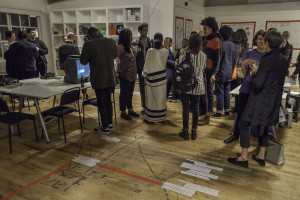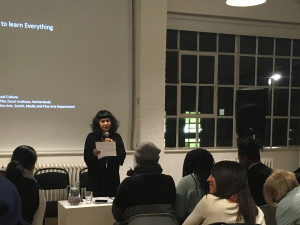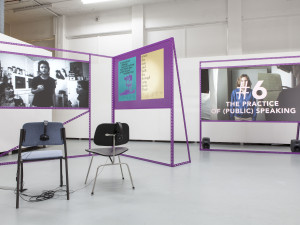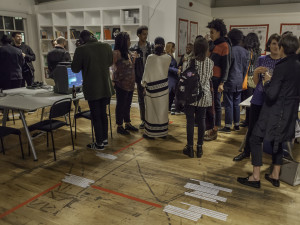
Object Positions Lecture 1 | Nana Adusei-Poku: Everyone has to learn everything!
Followed by a conversation with Francisco Carballo
Thursday 2 March 2017
6:30pm
Free, no booking required
The idea that everyone has to learn everything is of course a utopic and equally impossible wish, speaking against the hierarchies and erasure of knowledges and practices that don’t confine with the dominant narrative of modernity. What kind of labour is involved in practicing decoloniality if the knowledge is understood as a cognitive process and aesthetics as a process of feeling? This lecture will explore the notion of decolonial aesthetics through the lens of art education and the pitfalls of diversity politics. Decoloniality, here is understood as a practice aiming for a transformation of Eurocentric epistemologies, stressing the importance of the production of knowledge in different (local) geopolitical contexts and the necessity to create space for neglected epistemologies
Nana Adusei-Poku (PhD) is Research Professor in Visual Culture at Rotterdam University and Guest Lecturer in Media Arts and Master Fine Arts at the University of the Arts, Zurich. She received her PhD from Humboldt University Berlin for her thesis on post-black art, following degrees in African studies and gender studies at Humboldt University, and in media and communications at Goldsmiths College, University of London. She has been a visiting scholar at the University of Ghana, Legon; the London School of Economics; and Columbia University, New York. She most recently published: Catch me if you can! which is a critical reflection on the state of Diversity and Decolonisation in the Arts and Art education with L’international.
Francisco Carballo is Deputy Director of The Centre for Postcolonial Studies and has been with the Politics Department at Goldsmiths since 2012. He trained in sociology, political theory and cultural studies. He taught at the National Autonomous University of Mexico. His current research addresses Latin American politics from below (especially in Argentina, Bolivia and Mexico), decolonial and postcolonial theory and rough politics. This is understood as an effort to trace the murky contours that separate politics from lawlessness, political activism from sheer violence, and social bonds from criminal complicity in areas of the Global South. Francisco Carballo is currently preparing a book on decolonial politics with Argentinean theorist Walter Mignolo. In both his teaching and his research, he pays close attention to the way in which the language of politics is periodically reinvented through culture and the arts.
This first lecture in the Object Positions lecture series explores emotional labour in art education and the possibility of decolonial aesthetics. Led by curatorial fellow Teresa Cisneros, Object Positions is a year long programme of conversations, workshops, research and events exploring decolonial processes, colonial administrations and cultural equity.
Related

Event
Object Positions: Lecture 2 | Karen Salt: Administering Activism, Organising Change, Holding Our Form(s)
,

Event
Object Positions Lecture 3 | Reading the Dead: Denise Ferreria da Silva in conversation with Shela Sheikh

Event
Teresa test event

Event
Object Positions Public Lecture 5 | RESTING 4 SURVIVAL with niv Acosta followed by a conversation with madison moore
, –

Event
Holding Space — Open Call to Artists
–

Audio
Object Positions Public Lecture 1 | Nana Adusei-Poku: Everyone has to learn everything!

Audio
Object Positions Public Lecture 2 | Karen Salt: Administering Activism, Organising Change, Holding Our Form(s)

Audio
Object Positions Public Lecture 3 | Reading the Dead: Denise Ferreira da Silva in conversation with Shela Sheikh

Audio
Object Positions Public Lecture 5 | RESTING 4 SURVIVAL with niv Acosta followed by a conversation with madison moore